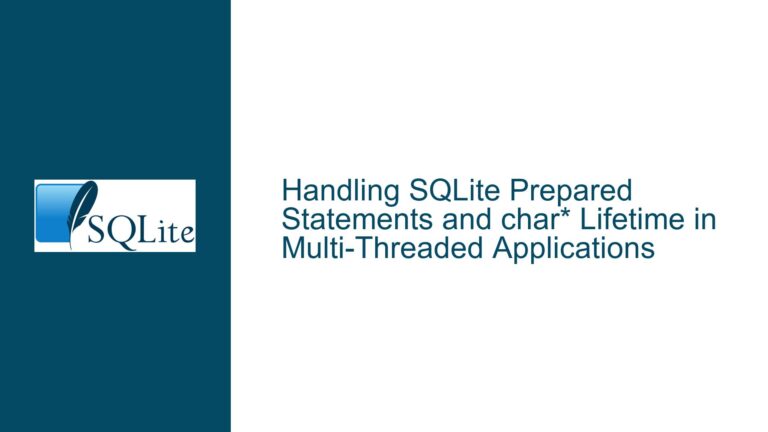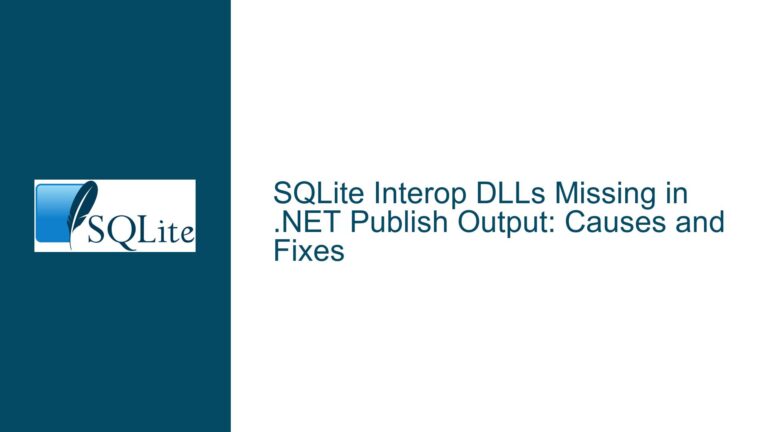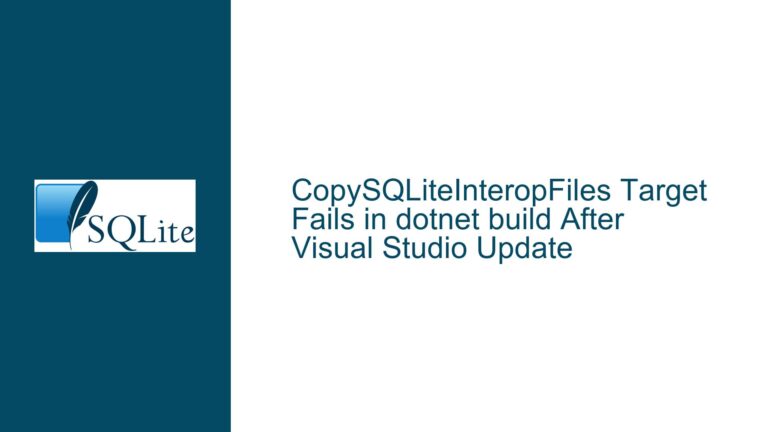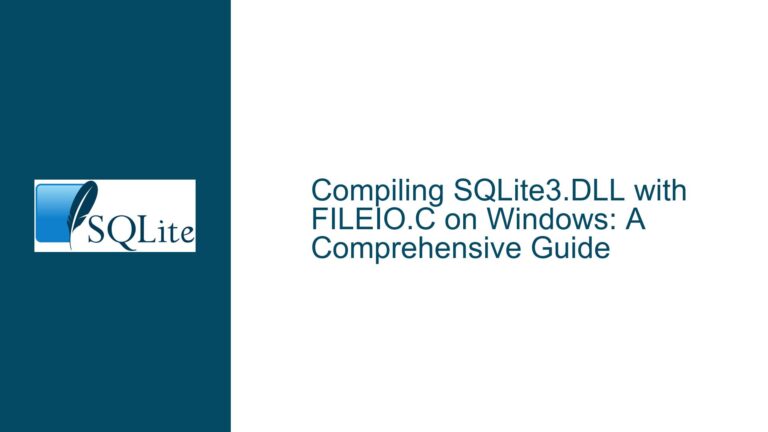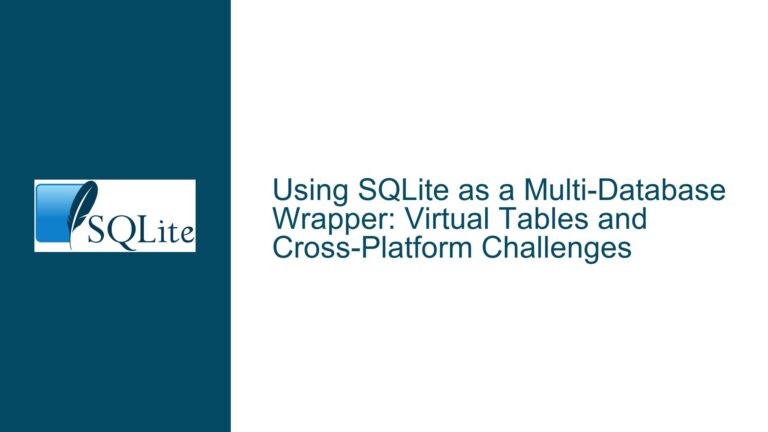Using Variables in SQLite CLI .read Scripts for Dynamic CSV Imports
Issue Overview: Dynamic File Paths in SQLite CLI .read Scripts
The core challenge revolves around dynamically specifying file paths within SQLite Command-Line Interface (CLI) scripts executed via the .read command. Users often need to parameterize portions of file paths (e.g., month/year identifiers in filenames) to automate repetitive tasks like importing CSV files with time-stamped names. For example, a script may need to import /home/ryan/www/default.website/reports/Jun2022.csv into a table, but the "Jun2022" portion must change programmatically each month without manual editing. SQLite’s CLI lacks native support for variable substitution in dot-commands (e.g., .import), leading to attempts to work around this limitation through shell variables, date/time functions, or filesystem hacks.
The discussion highlights three critical pain points:
- Variable Substitution Limitations: SQLite CLI does not expand environment variables or shell-style variables (e.g.,
$monthyear) within.readscripts. Attempts to inject variables directly into dot-commands result in syntax errors or literal interpretation of the variable name as part of the file path. - Date/Time Handling Complexity: Generating the correct month/year suffix using SQLite’s
strftimerequires precise handling of edge cases, such as date arithmetic around month boundaries (e.g., subtracting one month from March 31 may inadvertently yield March 3 instead of February 1 if not adjusted properly). - Workflow Integration Challenges: Users seek solutions that integrate cleanly with automation workflows, avoiding manual file renaming or script modification. Proposals include symbolic links, temporary files, or leveraging external scripting languages to preprocess paths before invoking SQLite.
Possible Causes: Why Variables Fail in .read Scripts and Date Arithmetic Misbehaves
SQLite CLI’s Dot-Command Parsing Limitations
SQLite’s CLI processes dot-commands (e.g., .import, .read) using a simple parser that does not support variable interpolation or shell-like expansion. When a script contains $monthyear, the CLI treats it as a literal string rather than substituting it with an environment variable or script-defined value. This is intentional: the CLI is designed for interactive use and basic scripting, not as a full-fledged shell. For example:
.import --csv /path/to/$monthyear.csv Mytable
This command attempts to import a file named $monthyear.csv (literally), which does not exist, resulting in an error.
Inadequate Date Arithmetic for Month Boundary Conditions
SQLite’s date/time functions can generate incorrect month values when subtracting months from dates near month-end. Consider:
SELECT strftime('%Y-%m', '2022-03-31', '-1 month');
-- Returns '2022-03' (incorrectly)
This occurs because SQLite adjusts dates by decrementing the month number without validating day values. March 31 minus one month becomes March 3 (since February has 28 or 29 days), but the month remains March. To avoid this, the start of month modifier must reset the day to 1 before arithmetic:
SELECT strftime('%Y-%m', '2022-03-31', 'start of month', '-1 month');
-- Returns '2022-02' (correct)
Without this adjustment, scripts targeting the previous month’s data will fail when run on days exceeding the previous month’s maximum day count.
Overreliance on SQLite for Filesystem Operations
The initial workaround proposed in the discussion uses fsdir() and WriteFile() to dynamically locate and copy CSV files. While creative, this approach is brittle:
fsdir()is part of SQLite’s fileio extension, which must be explicitly loaded.- The
LIKEclause matching filenames assumes a specific naming convention (e.g., "Jun2022.csv") and may fail if multiple files match the pattern. - Writing to
/tmp/tmp.csvintroduces concurrency issues if multiple instances of the script run simultaneously.
Troubleshooting Steps, Solutions & Fixes: Parameterization Strategies for SQLite CLI Scripts
Strategy 1: Shell Script Wrapper with Variable Preprocessing
Step 1: Generate the Dynamic File Path in the Shell
Use a shell script to compute the month/year suffix and pass it to SQLite via command-line arguments or temporary files. Example:
#!/bin/bash
monthyear=$(date +"%b%Y" --date="last month")
sqlite3 database.db ".read import_script.sql" "$monthyear"
Step 2: Modify the SQLite Script to Use Placeholders
In import_script.sql, use ? placeholders for parameters passed via the shell:
.import --csv /home/ryan/www/default.website/reports/?.csv Mytable
Caveat: This approach works only if the CLI is invoked with parameters (e.g., sqlite3 database.db ".read script.sql" "Jun2022"). However, .import does not accept parameters directly. To resolve this, generate the entire .import command dynamically in the shell:
#!/bin/bash
monthyear=$(date +"%b%Y" --date="last month")
echo ".import --csv /home/ryan/www/default.website/reports/${monthyear}.csv Mytable" > import_script.tmp
sqlite3 database.db ".read import_script.tmp"
rm import_script.tmp
Strategy 2: Symbolic Links to Static Filenames
Step 1: Create a Symbolic Link to the Latest CSV
Use a cron job or script to update a symlink pointing to the current month’s CSV:
#!/bin/bash
monthyear=$(date +"%b%Y" --date="last month")
ln -sf "/home/ryan/www/default.website/reports/${monthyear}.csv" "/home/ryan/www/default.website/reports/latest.csv"
Step 2: Reference the Symlink in the SQLite Script
In import_script.sql, import the static symlink path:
.import --csv /home/ryan/www/default.website/reports/latest.csv Mytable
This decouples the SQLite script from dynamic filename generation, simplifying maintenance.
Strategy 3: In-SQLite Date Arithmetic with Boundary Handling
Step 1: Compute the Correct Month/Year in SQLite
Use strftime with start of month to avoid day-related arithmetic errors:
WITH params AS (
SELECT
strftime('%m', 'now', 'localtime', 'start of month', '-1 month') AS month,
strftime('%Y', 'now', 'localtime', 'start of month', '-1 month') AS year
)
SELECT
CASE month
WHEN '01' THEN 'Jan' WHEN '02' THEN 'Feb' WHEN '03' THEN 'Mar'
WHEN '04' THEN 'Apr' WHEN '05' THEN 'May' WHEN '06' THEN 'Jun'
WHEN '07' THEN 'Jul' WHEN '08' THEN 'Aug' WHEN '09' THEN 'Sep'
WHEN '10' THEN 'Oct' WHEN '11' THEN 'Nov' WHEN '12' THEN 'Dec'
END || year AS monthyear
FROM params;
Step 2: Use the Generated monthyear in File Operations
If the fileio extension is available, export the CSV path to a temporary file:
WITH ... (as above)
SELECT WriteFile('/tmp/monthyear.txt', monthyear) FROM params;
Step 3: Read the Temporary File in the Shell
After running the SQLite script, read /tmp/monthyear.txt to construct the .import command. This hybrid approach requires splitting the workflow into SQL and shell components.
Strategy 4: Custom Builds with Tcl Extension Support
Step 1: Build SQLite with Tcl Extension
Compile SQLite with the tcl_shell_extension to enable Tcl variable substitution:
git clone https://github.com/sqlite/sqlite
cd sqlite
./configure --enable-tcl --with-tcl=/usr/lib/tcl8.6
make tcl_shell_extension sqlite3x
Step 2: Use Tcl Variables in Dot-Commands
In the SQLite CLI, set and use Tcl variables:
.. set monthyear [clock format [clock add [clock seconds] -1 month] -format "%b%Y"]
.import --csv /home/ryan/www/default.website/reports/$monthyear.csv Mytable
Note: This requires familiarity with Tcl syntax and custom SQLite builds, limiting portability.
Strategy 5: Parameterized Script Generation with sed/awk
Step 1: Generate the SQLite Script with sed
Use sed to replace placeholders in a template script:
monthyear=$(date +"%b%Y" --date="last month")
sed "s/MONTHYEAR_PLACEHOLDER/$monthyear/g" template.sql > import_script.sql
Step 2: Execute the Generated Script
sqlite3 database.db ".read import_script.sql"
Template.sql:
.import --csv /home/ryan/www/default.website/reports/MONTHYEAR_PLACEHOLDER.csv Mytable
This approach avoids modifying the original script and integrates seamlessly into CI/CD pipelines.
Strategy 6: Leverage SQLite’s .parameter Command
Step 1: Bind Parameters Interactively
While SQLite’s .parameter command does not support dot-commands, it can store values for use in SQL queries:
.parameter init
.parameter set @monthyear "Jun2022"
Step 2: Use the Parameter in SQL Queries
INSERT INTO Mytable SELECT * FROM csv_read('/home/ryan/www/default.website/reports/' || @monthyear || '.csv');
Limitation: Requires the csv_read function (from the csv or fileio extension), and parameters cannot be used directly in .import.
Final Recommendation: Hybrid Shell-SQLite Workflow
For robustness and portability, combine shell-based preprocessing with SQLite’s date functions:
- Shell Script: Compute the month/year suffix and pass it to SQLite via a temporary script.
- SQLite Script: Use
strftimewithstart of monthto validate the date. - Error Handling: Check if the CSV file exists before importing, using
fsdir()or shell conditional statements.
Example Shell Script:
monthyear=$(date +"%b%Y" --date="last month")
csv_path="/home/ryan/www/default.website/reports/${monthyear}.csv"
if [ ! -f "$csv_path" ]; then
echo "Error: $csv_path does not exist" >&2
exit 1
fi
echo ".import --csv $csv_path Mytable" > import.tmp
sqlite3 database.db ".read import.tmp"
rm import.tmp
This approach minimizes dependencies, handles edge cases, and ensures the script fails gracefully when expected files are missing.

